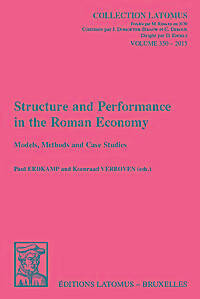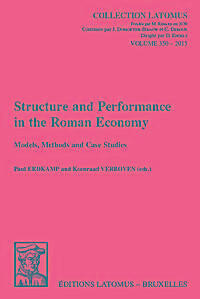
- Afhalen na 1 uur in een winkel met voorraad
- Gratis thuislevering in België vanaf € 30
- Ruim aanbod met 7 miljoen producten
- Afhalen na 1 uur in een winkel met voorraad
- Gratis thuislevering in België vanaf € 30
- Ruim aanbod met 7 miljoen producten
Zoeken
Structure and Performance in the Roman Economy
Models, Methods and Case Studies
€ 45,00
+ 90 punten
Omschrijving
History is a reality that can be observed only through the traces it has left. Some are words and images (on parchment, papyrus, stone or any other bearer) conveying us the emotions and reflections of people in the past. Others are the scars and leftovers of human lives and actions, scattered in the landscape, buried or sunk under water. Historians and archaeologists are experts in restoring the damage done to a body of evidence by time or human manipulation. We are trained empiricists, wont to look down and think bottom-up. Economic history, however, requires us to do more: we need to look up. Economics is about explaining patterns in human interaction by detecting its causes and effects. However good our restored data are, the patterns they reveal will always be too fragmented and have too many loose ends to unveil reality. Economic history is always an act of imagination. The challenge is to ensure that it does not become an insubstantial pageant. Theories, models and comparative history help us to do that. They are explanatory frames and tools, showing the consequences of our assumptions and suggesting solutions to fill in the gaps. They do not diminish the need for empirical research methods. The output of any model depends on the reliability of its input data. This book discusses theories and models we believe are useful in economic history, but it also invites the reader to look at methods (both new and traditional) to ensure that input data are reliable, and offers case studies showing what can be done.
Specificaties
Betrokkenen
- Uitgeverij:
Inhoud
- Aantal bladzijden:
- 238
- Taal:
- Engels
- Reeks:
- Reeksnummer:
- nr. 350
Eigenschappen
- Productcode (EAN):
- 9789042932807
- Verschijningsdatum:
- 5/10/2015
- Uitvoering:
- Paperback
- Formaat:
- Trade paperback (VS)
- Afmetingen:
- 160 mm x 239 mm
- Gewicht:
- 408 g

Alleen bij Standaard Boekhandel
+ 90 punten op je klantenkaart van Standaard Boekhandel
Beoordelingen
We publiceren alleen reviews die voldoen aan de voorwaarden voor reviews. Bekijk onze voorwaarden voor reviews.










